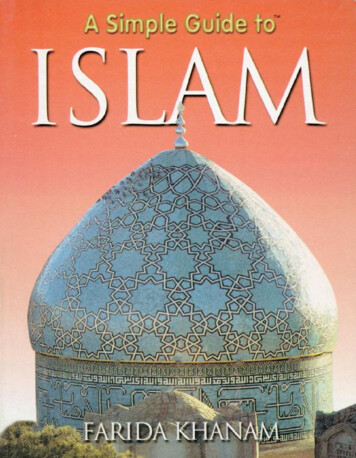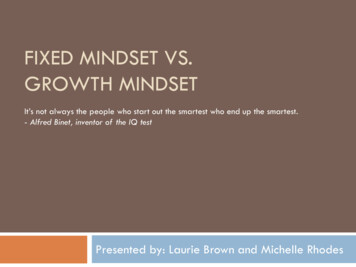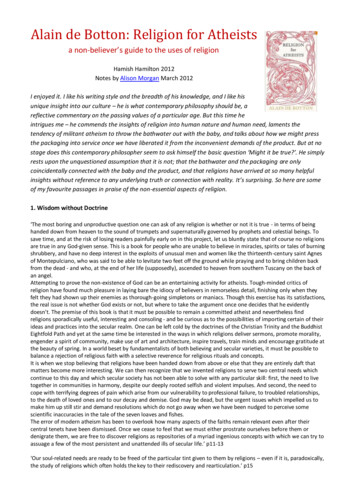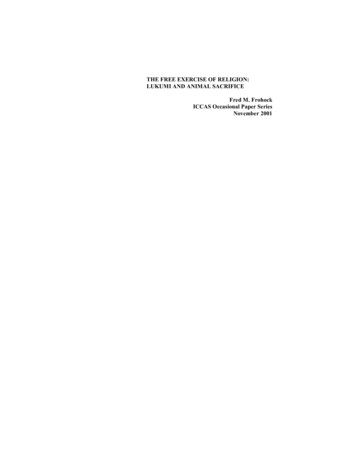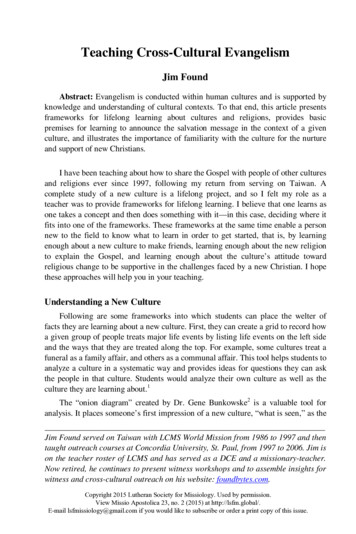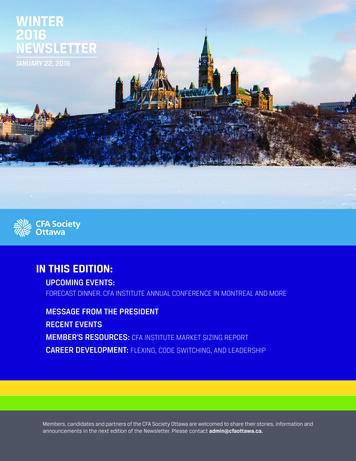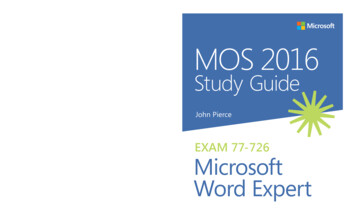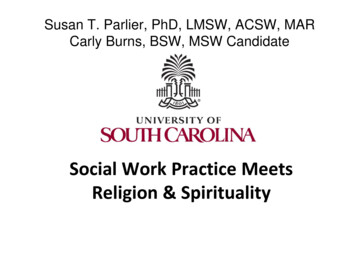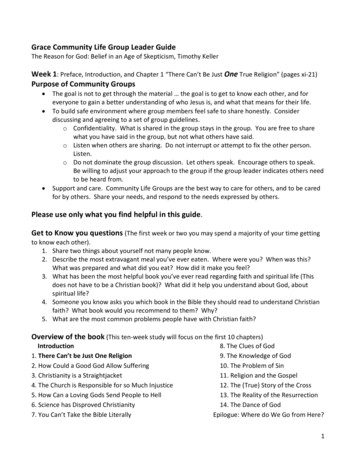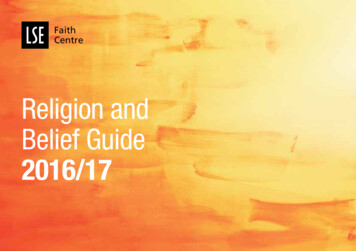
Transcription
FaithCentreReligion andBelief Guide2016/17
ContentsWelcome 1Believing at LSE 2Faith Centre Spaces 5Building bridges, making friends 6LSE Faith and Leadership 7Wellbeing in the Faith Centre 8Meaningful Work 9Buddhism 10Christianity 12Hinduism 14Islam 16Judaism 18Sikhism 20Atheism and humanism 22WelcomeWelcome to LSE. You have joined anincredibly diverse community drawn from140 countries.Religion and belief is just one of the markersof our rich diversity with all the world’s majorreligious traditions represented here. Religiousgroups generate a lot of community andcharitable activity on campus, and the interfaithinitiatives of the LSE Faith Centre provide wonderful opportunities to bringthese groups together in dialogue and common purpose. But we are alsoaware that many students come from situations of religious conflict oroppression of religious minorities. We are keen that LSE is a place that doesnot import those conflicts but exports a model of peaceful coexistencearound the world. To do that we all need to seek to understand and respectthe religious identities, beliefs and practices of our fellow students, staffand colleagues. This guide provides practical information for the wholeLSE community as well as a reference for adherents of particular religionsabout the beliefs and practices of those around us. I hope it will be of useto you in your time at the School.Professor Janet HartleyChair of the LSE Faith Centre Advisory BoardFinding support 24Dr Georgette Bennett of the Tanenbaum Center forInterreligious Understanding speaking in February 2015Interfaith calendar 2016/17 25Religious Observance Policy 291
Believing at LSERecent years have seen some very dramaticchanges in LSE’s provision for religion and belief.In 2014 we opened our new state of the art FaithCentre in the Saw Swee Hock Student Centre. Thisis symbolic of a transition in the way religion isbeing engaged with across the higher educationsector, arising from the incorporation of religion andbelief into equality legislation and the increasedprominence of religious issues on campus. So we are proud to say that our newprovision puts LSE at the forefront of these changes.We have come to recognise the importance of religious identity to a largeproportion of our students and staff and we are determined to create anenvironment on campus where religion can be fully observed and respected,as well as debated and challenged. None of this compromises the kindof secularity that has always characterised LSE, giving no privilege to anyparticular religious standpoint. But it is a recognition that religion is somethingthat is not merely studied here; for many of today’s staff and students it is alsolived and practised.In this guide you will find lots of information about the LSE Faith Centre, ouracclaimed “Faith and Leadership” programme, our interfaith trips to Israel andPalestine and a new programme for this year on “Meaningful Work.” At theback you will find our Religious Observance Policy and an interfaith calendar.The main body of the booklet sets out the beliefs and practices of six of thelargest religious groups on campus and the concerns of atheists/humanists.2The information provided here is both for adherents of these traditions and toeducate the rest of us in the worldviews of fellow members of our community.Given the restrictions of space we have included only those religions withorganised representation on campus in the last year, which are also the mainreligions recognised in the UK Census 2011.My role as Chaplain and Interfaith Adviser is to oversee all this provisionand do all I can to make our campus a place where religion can be practisedfaithfully and where differing religious views can be discussed respectfullyand constructively. So whoever you are, don’t be afraid to contact me if youhave a query or difficulty in relation to your religious identity and how youpractise it at LSE.I’m also available to talk to students of any faith or none pastorally aboutanything you want to discuss. I spent a long time being a student myself(!) sowhile there is a lot of fun to be had, I know it can sometimes be a tough time.I hope this guide is useful and that you have a really good experience at LSE,growing in knowledge, in wisdom and (perhaps) in faith.Revd Canon Dr James WaltersChaplain and Senior Lecturer in PracticeEmail: j.walters2@lse.ac.ukTel: 020 7955 7965Web: lse.ac.uk/faithcentre@lsechaplainMission StrandsFaithSelfSocietyReligiousPersonalSocialThe Faith Centre’s objectives are:To equip studentswith interreligiousunderstanding and theskills to be leaders ininterfaith dialogue bothon campus and in thewider world.To expand students’experience in wellbeing,in spiritual development,and in awareness of theirown life aspirations.To engage in constructivecommunity buildingacross religiousgroupings among thestudent body and inwider society.3
“ The creation of the Faith Centre at LSEhas been a major step in recognizingthe crucial importance of understandingin the Faith CentrefaithWellbeingcommitmentsfor the understanding[Use image from p.6 of last year’s Religion&Belief Guide. Image is ofof contemporaryhere andwoman meditating, sittingsociety,looking down].worldwide.promotesThe Faith CentreTheis also Centrea wellbeing hub,hosting a rangeanof activitiessuch as Mindfulness, Yoga and Tai Chi.engagement with these questions that isMore information on classes and times can be found on the Faithintelligent,respectful and independent. ItCentre diary or at the Reception.willThesupporttheCentregrowthof interreligiousCave in the Faithis also availableto LSE staff andstudentswhoneedaquietplaceoncampusforor prayer.understanding among people reflectionwho arelikely to be among the future shapersof society and thought; and it builds onyears of patient and skilful work at thegrass-roots in promoting constructivedialogue among young people. A genuinesign of hope.”Faith Centre SpacesThe sacred desertThe cavePrayer roomsThe theme of the LSE Faith Centre is the “sacred desert”. The desert is aplace of spiritual significance in nearly all the world religions. From theancient Hindu traditions of the Thar Desert of Rajasthan to the origins ofthe Judeo-Christian tradition at Sinai, the desert has been experienced asa place of profound religious intensity. Crucially, the nomadic traditionof the desert reflects the need for space to be shared and not colonised.But the desert has also been a place of inter-religious encounter, not leastthrough commerce along trade routes. So our “sacred desert” is a placeof stillness for all people, a place where different religious groups can “setup camp” for a while, but also a place for all to encounter people of otherfaiths, to hear their stories, to share hospitality and to converse about theissues of the day.This is a secluded space availablefor quiet reflection and prayer.Prayer and washing facilities forMuslim prayers.The Desert RoomReceptionThis room is used for many differentactivities including worship,discussion and meditation.Find out more about activities,programmes and facilities at theFaith Centre.The idea of the desert is captured in our striking stained glass windowsdesigned by the President of the Royal Academy of Art Christopher LeBrun. This world class work of art reflects the theme through an abstractinteraction of colour that evokes both the contrasts of the desert and thedynamic of the interreligious encounter.Lord Williams of Oystermouth45
Building bridges, making friendsLSE Faith and LeadershipLSE has an established programme of interfaith activities both on campusand in the wider community. Want to improve your knowledge of world faiths?A range of different interfaith events, lectures, workshops and seminars are organisedby the Faith Centre to foster interfaith understanding and explore religious issues inthe world today. We host a wide range of speaker events and panel discussions withacademics, faith leaders and politicians. We organise an informal programme for newstudents at LSE called Interfaith Buddies, which connects students across religiousdivides and offers an opportunity to make new friends and learn about other people’sbeliefs. We help students develop their involvement in charity and education work,and have organised fund raisers for Syrian Refugees and interfaith assemblies in localprimary schools. We also design and implement transformational programmes forLSE students, most notably a week in Israel and Palestine for Muslims, Christians andJews, and the LSE Faith and Leadership course. Want to meet men and women in positions of leadership from differentfaith backgrounds?Interfaith Encounter: Israel and PalestineWe take a group of 18 LSE students of different faiths and no faith to Israel andPalestine each year for a week, during which time we visit major sites of the Jewish,Christian and Islamic faiths, and meet with local people working for peace acrossreligious divides.This trip is designed to improve participants’ understanding of the complexities ofthe Israel and Palestine conflict, particularly its religious dimensions which are oftenneglected in political scientific analysis. We encourage the students to considerhow their own religious commitments, drawn into dialogue with those of differenttraditions, may be a resource for peace-making and conflict resolution.6Students are given further opportunity to reflect more deeply on the region, itspolitical and religious significance, in preparatory and follow-up workshops. Keen to develop your leadership skills?LSE Faith and Leadership is an extracurricular programme that will deepen your understanding ofdifferent religions, develop your leadership skills and enhance your CV.LSE forms future leaders. Our students come from all over the world and go on to positions ofleadership in business, finance, government and civil society. 34 have become world leaders.To lead successfully in today’s world it is increasingly clear that you need a sophisticatedunderstanding of religion. Three quarters of humanity now profess a religious faith. That is set torise to 80 per cent by 2050. But we’re increasingly aware that religion can be used for the badas well as the good. The twenty-first century requires leaders who are sufficiently informed tounderstand the complex relation of religious narratives to social and political change and relatetheir own faith commitments wisely to the responsibilities they bear.The course runs on Monday evenings in the Lent Term and includes one residential weekend.It comprises: Short, creative introductions to the main world faith traditions from expert scholars andcommunity leaders. Consideration of the changing dynamics of religion in the world today and evolving modelsof secularism and religious pluralism. Training in decision-making, mediation and reconciliation by people experienced in the field. Sessions with leaders in the different sectors studied at LSE (eg, business, politics, law) froma range of different faith backgrounds.Web: lse.ac.uk/faithcentre/faithandleadership7
Wellbeing in the Faith CentreMeaningful WorkThe Faith Centre is also a well-being hub, hosting a rangeof activities such as Mindfulness, Yoga and Tai Chi.The Faith Centre will be running a series of events and workshops onthe subject of “Meaningful Work” in partnership with St Paul’s Institute,LSE Life and LSE Careers.Mindfulness is the psychological process of knowing directly what is goingon inside and outside ourselves, moment by moment.Deriving from Buddhist traditions, mindfulness encourages you to pay moreattention to the present moment – to your own thoughts and feelings, andto the world around you. Evidence suggests that practising mindfulness canbe beneficial to a person’s mental wellbeing, and as part of managing stressand anxiety.Mindfulness, Yoga and Tai Chi classes are available for LSE staff and students.Monday12 noonMindfulnessWednesday6pmTai ChiThursday8amTai Chi12 noonYoga1pmAshtanga YogaFridayThis programme will run during Michaelmas term 2016 and explores howto reconcile personal values and a sense of purpose with the demandingambitions of modern professional life. Can everybody discover meaning intheir work and does it necessarily mean a low income? Are some sectorsmore meaningful than others, or does every career have the potential formeaningful work? How can we respond proactively to our values andambitions in our academic and professional development?Meaningful Work will open with an interdisciplinary academic panelat LSE, followed by four workshops and a student-led closing event atSt Paul’s Cathedral.Please see the Faith Centre diary or ask at Reception for more information onclasses, suitable levels and timings. Please note, class times may be subject tochange from term to term.The Cave in the Faith Centre is also available to LSE staff and students who needa quiet oasis on campus for reflection or prayer.89
Buddhism“ Hatred does not cease by hatred, but only by love; Customs and practicesthis is the eternal rule.”Meditation practices can be divided into samatha and vipassana practices.Siddhārtha Gautama BuddhaBeliefsBuddhism teaches that life is unsatisfactory. Life can be experienced aspainful and frustrating, impermanent and fleeting, or insubstantial. Whenwe experience life as unsatisfying, we tend to crave pleasant experiencesand avoid disappointing ones. We do this more or less habitually. Ourhabits tie us into a reactive cycle of craving and aversion. This exhaustingcycle can be broken, when our experience is fully aligned with Reality. TheBuddha taught that a way to break this cycle is to practise ethics andmeditation, and to cultivate wisdom, which is a deep understanding andacceptance of things as they are.The Triratna Buddhist Community (and Order) was established 45 yearsago by Ven Urgyen Sangharakshita, an Englishman who was ordained asa Buddhist monk in India and practised there for 20 years before comingback to Britain. He created a new kind of Buddhist movement, whichtranslates traditional Buddhist teachings into forms of practice appropriatefor the modern world.The Order emphasises equal ordination for men and women irrespectiveof their lifestyle. Commitment to spiritual practice is primary. Other keyemphases are an ecumenical approach to traditional Buddhist teachings,spiritual friendship, and appreciation of the arts.10Samatha practices develop calm, concentration and positive emotion andare practised as Mindfulness of Breathing and Development of LovingKindness (Metta Bhavana). Vipassana practices aim at developing insightinto Reality. Developing and cultivating wisdom happens through studyingand reflecting the Dharma, the Buddha’s teaching. Throughstudy and reflection we deepen our understanding of whatReality is and how we can best live our lives according to thatunderstanding. Buddhist ethics is an ethics of intention inwhich the key principle is non-violence.Buddhists celebrate a number of festivals timed to thefull moon: Parinirvana Day in February, Buddha Day(Wesak) in May, Dharma Day in July, PadmasambhavaDay in October and Sangha Day in November. Allare important events to celebrate together and tocontemplate key teachings of the Buddha.Practical informationSilent meditation sessions are offeredduring term time.Find the LSESU Buddhism AwarenessSociety on Facebook11
Christianity“The glory of God is a human being fully alive.”St Irenaeus (2nd century)BeliefsChristians believe that God became fully present in the world in the person ofJesus of Nazareth. A Jew himself, he summarised the law as loving God andneighbour. But he extended the message of God’s redemption to all people andChristians believe that in dying on the Cross, he made himself a sacrifice toreconcile all humanity with its creator. They believe he rose from the dead and hassent the Spirit of God to renew and inspire people in the world today.Consequently, Christians have a distinctive understanding of God as a trinity –Father (Creator), Son (Redeemer), and Holy Spirit (Sustainer) – while stillemphasising the unity of God. Their scriptures consist of four different accountsof the life of Jesus (gospels), an account of life among the earliest disciples, aprophecy about the future, and a number of letters to early Christian communities.Many of these letters were written by St Paul, a former opponent of Jesus’ earlyfollowers who had a powerful conversion experience and went on to expoundmuch of Christian thought and practice. These different books comprise the NewTestament which Christians add to the Hebrew scriptures of the Jewish faith.Customs and practices12Somebody becomes a Christian through Baptism (immersion in water) whichsymbolises a sharing in the death and resurrection of Jesus. This is an initiationinto the life of the Church which Christians believe to be the body of Christ inthe world today. Christians pray, worship and read the Bible together. They alsofollow Jesus’ instruction of taking bread and wine, and declaring it his body andblood offered in sacrifice for all. Jesus was poor andhomeless, and was criticised for associating himself withothers who were socially outcast. So Christians believe thatas well as teaching others about Jesus they should work for peaceand social justice.The principal Christian festivals are Christmas (celebrated on 25December by most Christians), when the birth of Jesus is remembered,and Easter (which varies according to the lunar calendar) when Jesus’resurrection from the dead is celebrated.Practical informationThere is an Anglican/Episcopalian service of Holy Communion, to whichChristians of all denominations are welcome, celebrated in the FaithCentre every Monday at 11am.Roman Catholic SocietyThe AnchorageWe bring together Roman Catholics at LSE to share our faith and celebrateMass together on Wednesdays at 1.15pm in the Faith Centre. We also holdsocials, retreats, Rosary meetings and other events, and work in the localcommunity, for example volunteering at St Patrick’s soup kitchen in Soho.The Anchorage is a church for students interested in exploring theChristian faith in community, through study and worship and in actsof service. It is run by the Church of England and meets at 5pm in theFaith Centre on Sundays in term. The Anchorage is linked to the StudentChristian Movement which has a long history at the LSE. For moreinformation visit theanchoragelondon.org or find us on Facebook.We also work with Newman House, the Catholic Chaplaincy to Londonuniversities, which provides us with our Catholic Chaplain at LSE, Fr StephenWang, who is Senior Chaplain in the Roman Catholic Diocese of Westminster.Tel: 020 7387 6370Email: su.soc.catholic@lse.ac.ukFind the LSESU Roman Catholic Society on FacebookFr Stephen email: swang@universitycatholic.netChristian UnionHillsong ConnectThe Christian Union’s mission statement is to “know Christ and makeHim known”. We seek to give every student at LSE an opportunityto hear about the Good News of Jesus Christ. In addition to outwardfocused events, we meet regularly on Thursdays at 6pm in the FaithCentre for CU central meetings, designed to encourage and equip usfor evangelism.We are a group of students who want to know Jesus better and make Himknown. We are part of Hillsong Student Life and want to see our members gettinginvolved in our local Church and our university communities. We meet weekly andhave a strong emphasis on Christian worship music.Rejoice Pentecostal PrayerLSE Rejoice is a Christian staff network established in October 2014.Rejoice is open to all.We meet at the LSE Campus every Friday at 12 noon for an hour of praise,worship and discussions based on the teachings and understanding of thelife of Christ.LSE Rejoice can be contacted via email at rejoice@lse.ac.ukFind the LSESU Hillsong Connect Society on Facebook.The Christian Union also holds Mandarin and Korean speaking meetingsin the Faith Centre.Email: su.soc.christian-union@lse.ac.uk13
Hinduism“The best way to find yourself is to lose yourselfin the service of others.”Mahatma GandhiBeliefsThe term “Hinduism” was coined as recently as the 19th century to cover awide range of ancient creeds, textual traditions and religious groups. ThusHinduism has no single founder, doctrine or religious authority. Hinduismis best understood as a complete way of life, a path of sanctification anddiscipline that leads to a higher level of consciousness. This path is knownas Dharma, the ancient law.Hindus are often thought to be polytheists but most claim to believe inone supreme god who is incarnated in many forms. Hindus revere a bodyof texts as sacred scriptures known as the Vedas. Veda is a Sanskrit wordmeaning knowledge and many of these scriptures are concerned withDharma. Other important texts include the great epics of the Mahabharataand Ramayana. The Bhagavad Gita (part of the Mahabharata) is verypopular in the West.Hindus believe that existence is a cycle of birth, death and rebirth,governed by Karma, a concept whereby beneficial effects are derived frompast beneficial actions. Hindus believe that the soul passes through a cycleof successive lives and its next incarnation is always dependent on howthe previous life was lived.14Customs and practicesHindus follow the lunar calendar and particular days are set aside duringthe week and month to honour particular manifestations of God. The mainfestivals are celebrated in different ways by different communities. Themost commonly celebrated festivals are Diwali, the Festivalof Lights, and Navrathi, nine nights which celebratethe triumph of good over evil. These take placetwice a year.Practical informationThe LSE Hindu Society is recognised as thefirst such society in this countryand has close links with theNational Hindu Students Forum. Itcan provide members with all theinformation they need and give theman opportunity to celebrate variousfestivals at university.Email: su.soc.hindu@lse.ac.ukFind the LSE Hindu Societyon Facebook15
Islam“ Let yourself be drawn by the stronger pull of thatwhich you truly love.”Jalal ad-Din Rumi (13th century Sufi poet)BeliefsIslam is an Arabic word which means willing submission to God. The root ofthe word Islam comes from a word meaning peace and Muslims believe itis the way of peace as laid down in the Quran. The Arabic word Allah meansOne God, and at the heart of the Muslim faith is belief in the unity anduniversality of God. Muslims also believe in the unity of mankind, under onefather, Adam, and have a strong sense of the Muslim community or Ummahand an awareness of their solidarity with all Muslims worldwide. Muslimsbelieve that God has sent a succession of prophets such as Adam, Noah,Abraham, Jacob, Moses and Jesus, and see Mohammed as the last and finalprophet. Mohammed was born in Mecca in 570 CE and received revelationsfrom God through the Angel Gabriel over a period of 23 years. These wererecorded in Islam’s Holy Book known as the Quran, which is regarded as theliteral word of God. Muslims are taught to recite the Quran in Arabic as anytranslation of the Holy Book is seen as inadequate. Around one fifth of theworld’s population practises Islam.Customs and practicesPractical informationIslam has five pillars that represent the foundation of Islamic worshipand practice:Prayer facilities for LSE staff and students are located in the Faith Centre. Shahadah: “There is no God but the one true God and Mohammed is hismessenger”. Reciting this with intention three times makes someone a Muslim. Salat: Prayer five times a day at given times. Zakat: Two and a half percent of a Muslim’s assets over a given specifiedamount is given in welfare tax to benefit the poor. Hajj: An annual pilgrimage to Mecca which is a requirement at least oncein a lifetime for those who can afford it. Sawm: During the month of Ramadan (the ninth month of the Islamic lunarcalendar), Muslims are required to abstain from food, drink and sexual actsfrom dawn until sunset.The end of Ramadan marks the beginning of the festival of Eid ul-Fitr whenMuslims visit the Mosque, give charity, exchange presents and cards, andcelebrate with family and friends. Eid ul-Adha coincides with the completionof the Hajj and unites the whole Islamic community.Jummah prayers are at 1.15pm on Fridays in the Venue (basement of SawSwee Hock Student Centre).Mosques near LSE Halls of Residence Bankside: Bait-ul-Aziz Islamic Cultural Centre, 1 Dickens Square(off Harper Road), London SE1 4JL Rosebery Avenue: Holborn Muslim Community Association,33 Brookes Court, Baldwin Gardens, London EC1N 7RR Passfield: Islamic Cultural and Education Centre , 68 Churchway,Somers Town, London NW1 1LT High Holborn: LSE Prayer Room Carr-Saunders: Muslim World League, 46 Goodge Street, London W1T 4LXIslamic SocietyEmail: su.soc.islamic@lse.ac.ukFind the LSE Islamic Society on Facebook1617
Judaism“ The pure righteous do not complain of the dark,but increase the light; they do not complain ofevil, but increase justice; they do not complainof ignorance, but increase wisdom.”Rav Kook (20th century Rabbi)BeliefsThe Jewish people believe themselves to be descended from a Semitictribe that originated in the land of Canaan in the Middle East. Their earlyhistory is told in the Hebrew scriptures which recount how God promisedto Abraham, a trader and leader of a nomadic tribe, that his descendantswould be the father of a great nation. Abraham’s grandson Jacob had12 sons who became ancestors of the twelve tribes of Israel. They wereenslaved in Egypt and the book of Exodus tells how they were liberatedunder the leadership of Moses. For many years they wandered in thewilderness, during which time God revealed to Moses the Torah, or Law,which constitutes the Jewish way of life. After Moses’ death the tribeseventually conquered the Promised Land with the help of God.Study and interpretation of the Torah is an integral part of Jewish life.It covers family relationships, social interaction and good commercialpractice, as well as setting out the religious rituals that are still celebratedtoday. In the modern world the vast majority of Jews are less than fullyobservant and there is a broad spectrum within the Jewish communityfrom orthodox, to reform, to entirely secular.18Customs and practicesPractical informationThe Jewish Sabbath begins on Friday evening at sunset and is animportant time when families gather for the Shabbat meal. Orthodox Jewswill not drive or carry out domestic chores during the Sabbath.Kosher lunches are available on the 4th floor of the Old Building, andkosher sandwiches in the nearby Sainsbury’s, at the coffee cart outsideTower 1 and in the cafe in Clare Market Building.There are five festivals on which observant Jews are forbidden to work.The New Year (Rosh Hashanah) falls in the autumn and is followed tendays later by the most solemn day of the year, the Day of Atonement(Yom Kippur). The other majorfestivals are known as the threepilgrim festivals: Passover(Pesach) in the spring,Pentecost (Shavuot)which occurs sevenweeks later andTabernacles (Sukkot)which takes place inthe autumn.Most of the community life happens in North West London, in GoldersGreen and Hendon. There is a Chabad centre at Marble Arch.Jewish food laws arehighly complicated,prohibiting certainanimals and shellfish.Acceptable animalsmust be slaughtered insuch a way as rendersthem kosher.Jewish SocietyThe Jewish Society at LSE is non-denominational and cross-communal sowelcomes students of all affiliations. The society is also part of the LondonJ-Socs which means that many events are run together with other Jewishsocieties throughout London.Rabbi Gavin Broder, the Jewish chaplain to London universities, is availablefor one-to-one chats and welfare support and works with the JewishSociety and the UJS helping to support and run student events.Email: su.soc.jewish@lse.ac.ukFind the LSE Jewish Society on FacebookRabbi Broder email: rabbibroder@mychaplaincy.co.ukRabbi Broder tel: 020 7388 197619
Sikhism“ Without contentment, we are never fulfilled. Likevapid dreams, our goals and efforts are in vain.”Guru NanakBeliefsThe Sikh faith was revealed through the teachings of the ten Gurus, the firstof whom was Guru Nanak Dev Ji, born in 1469 CE in the Punjab. In 1708 the10th and the last Guru in human form, Guru Gobind Singh Ji, vested spiritualauthority in the Holy Sikh scriptures known as the Guru Granth Sahib Ji andtemporal authority in the community of initiated Sikhs, the Khalsa Panth.Sikhs strictly believe that there is one God. While being absolute and beyondhuman comprehension, God can be realised and experienced throughcontemplation and service. The object of a Sikh’s life is to develop Godconsciousness and ultimately to receive God’s grace.A Sikh’s way of life is guided by the principles of remembering God at alltimes (Naam Simran), earning a living by honest means (Kirat Karna), andsharing with the poor and needy (Wand Shakna). Sikhs try to avoid the fivevices that make people self-centred and build barriers against God in theirlives: lust, covetousness, attachment to things of this world, anger and pride.20Customs and practicesPractical informationThe 10th Guru, Gobind Singh Ji, reaffirmed the abolishment of distinctionsof caste, colour, race and religion. He made it obligatory for initiated Sikhsto share Amrit (holy water), to adopt the same religious name of Singh (lion)for men and Kaur (princess) for women, and to wear five articles of faith,commonly known as the five Ks: Kesh (uncuthair), Kangha (a small wooden comb),Kara (an iron/steel bangle), Kirpan(a short sword for defence) andKachhera (special shorts).Although not mentionedin the five articles offaith, the Daastar(turban) is an essentialaccompaniment, whichis worn to maintain thesanctity of Kesh andis treated with utmostrespect. The Guru instructedSikhs to abstain from tobacco,drugs and intoxicants. The Gurualso in
Interfaith calendar 2016/17 25 Religious Observance Policy 29 Welcome Welcome to LSE. You have joined an incredibly diverse community drawn from 140 countries. Religion and belief is just one of the markers of our rich diversity with all the world’s major religious traditions represent

